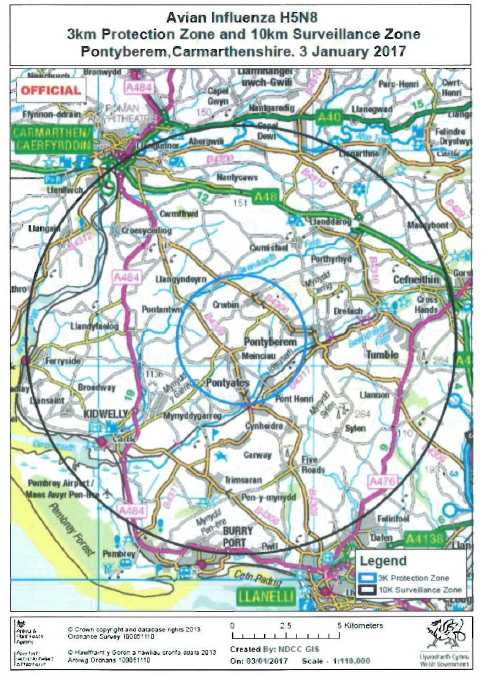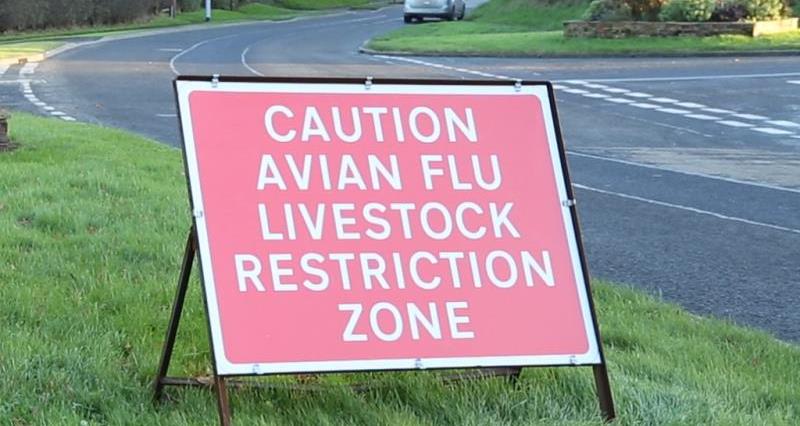It's the same strain (H5N8) as the outbreak in turkeys in Louth, Lincolnshire in December 2016. The Chief Veterinary Officer for Wales made the announcement today.
A three kilometre Protection Zone and ten kilometre Surveillance Zone have been put in place around the infected premises, to limit the risk of the disease spreading.
Get details of the zones here.
This is the same strain of the virus identified in a wild duck in Llanelli on 22 December, a turkey farm in Lincolnshire on 16th December and cases in wild, captive or domestic birds in many European countries, the Middle East and North Africa.
The advice from Public Health Wales (PHW) is that the risk to public health from the virus is very low and the Food Standards Agency has made clear that avian flu does not pose a food safety risk for UK consumers. Thoroughly cooked poultry and poultry products, including eggs, are safe to eat.
The Cabinet Secretary for Environment and Rural Affairs, Lesley Griffiths said: “This case of Avian Influenza H5N8 in a backyard flock near Pontyberem in Carmarthenshire follows the findings of infection in wild birds and a confirmed case in Lincolnshire. It serves to reinforce the need for all bird keepers, particularly back yard flock keepers, to adhere to the requirements set out in the Prevention Zone, remain vigilant for signs of disease and practice good biosecurity at all times.
The Chief Veterinary Officer, Christianne Glossop, said: “This case serves to remind us all of the risk of infection. The Prevention Zone and temporary suspension on gathering of poultry remain in place.
“It is extremely important that bird keepers practice the very highest levels of biosecurity. Even when birds are housed, there remains a risk of infection and keepers of poultry and other captive birds should ensure every effort is made to prevent contact with wild birds. The movement of poultry should be minimized, and clothing and equipment should always be disinfected.”
If you are concerned about the health of your birds you should seek advice from your veterinary surgeon. If you suspect that your birds are showing signs of the disease you should immediately report it to your local Animal and Plant Health Agency (APHA) office.
Poultry keepers are encouraged to provide details of their flocks to the Poultry Register. This will ensure they can be contacted immediately in the event of an avian disease outbreak so that they can take action to protect their flock at the earliest opportunity.
Members of the public are encouraged to report dead wild waterfowl (swans, geese or ducks) or gulls, or five or more dead wild birds of other species in the same location, to the Defra helpline on 03459 335577.
Biosecurity
The NFU is urging producers to maintain high standards of biosecurity, which includes:
- Cleansing and disinfecting clothing, footwear, equipment and vehicles before and after contact with poultry – if practical, use disposable protective clothing.
- Reducing the movement of people, vehicles or equipment to and from areas where poultry are kept to minimise contamination from manure, slurry and other products and using effective vermin control.
- Thoroughly cleaning and disinfecting housing at the end of a production cycle.
- Keeping fresh disinfectant at the right concentration at all points where people should use it, such as farm entrances and before entering poultry housing or enclosures
- Minimising direct and indirect contact between poultry and wild birds, including making sure all feed and water is not accessible to wild birds.
Avian Influenza Guidance - read our briefing

